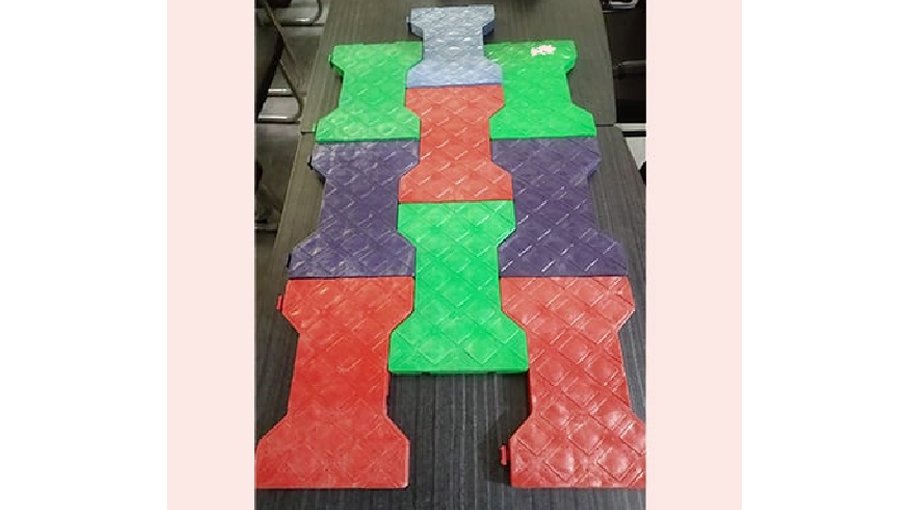Plastic waste turns into tiles first time in Bangladesh

A small entrepreneur in Kamrangichar area in Dhaka has made cost effective pavement tiles for the first time in Bangladesh by recycling alarmingly increased plastic waste, one of the factors of environmental degradation.
"I have already produced 1000 pieces of tiles by recycling plastic waste ... I am very optimistic that this tiles will be commercially viable as it is cost effective and durable compare to the ceramic tiles," Nazir Hossain, who turned the plastic waste into assets, told BSS on Monday.
The plastic tile was formally launched today by displaying at the "Poribesh Mela (environment fair) 2023" marking today's World Environment Day under the theme of 'solution to plastic pollution".
This innovation seems to give a new idea to the country's waste experts those are desperately looking for durable solution to manage plastic waste while nearly 650 tons of plastic waste have been collected daily only in Dhaka.
Nazir, the owner of Hossain engineering workshop in Kamrangichar area in the capital, thanked a local non-government organization named Resource Integration Center (RIC) that facilitated him to turn his innovation into reality.
The RIC with the support of Palli Karma-Sahayak Foundation (PKSF) has been implementing a pilot waste management project named Sustainable Enterprise Project (SEP) in Kamrangichar, Lalbag, Islambagh and Shyampur areas under the Dhaka South City Corporation.
"Our project objective is to develop manufacturing units for producing improved durable, attractive plastic materials as well to participate in community development for ensuring environment friendly atmosphere," said Zahir Uddin Ahmed, project coordinator of the SEP.
Apart from helping the community to ensure environment friendly plastic waste management systematically, he said, they are also working to introduce different innovation to produce tiles, bricks and even fuels from plastic waste.
Nazir, who has been making molds and patterns for plastic items since long, said the plastic tiles is cost-effective and lighter compare to the ceramic tiles.
"One day, I have seen that the city corporation was constructing footpath in front of my workshop with earthen tiles ... that day I thought why should I not try to make tiles by recycling plastic waste," he said while sharing his story.
Nazir said he shared his idea with the local NGO and took a soft loan to set for making mold to produce the tiles. "I collected raw materials from plastic waste and try my luck," he added.
He fixed the price of 11/7.5 inched plastic tile that weighted 280-300 gram at Taka 42 which is cheaper than the traditional ceramic tiles. "I keep the price low so that everyone even in village these could be used," he added.
After making the tiles, Nazir with the help of RIC sent his products to BUET for quality testing where he received a positive certificate that his plastic tiles could be used as commercial basis.
BUET mechanical engineering department professor Abdus Salam Akand said they took 12 tests to check the materials and found that as a first version of the product the quality is overall good.
"But, there is scope to further improve the tiles," he said adding that improvement of a product through RnD is a continuous process.
The professor said the plastic tiles will not be substitute of the ceramic one but it can be used on different purposes. "As it is lighter and durable people can use it on their rooftop or it can be use at footpath and workshops," he said.
There are 7th types of plastic in the earth so all type of plastic to go to use as a raw materials for producing tiles. Among the types, LDP, HDP and PP are more effective to produce tiles due to market price.
Akand said the plastic tiles would be reused through recycling after its lifetime. "Plastic tiles have the potentials to be used as commercial basis, if the entrepreneurs can produce it in large volume," he added.
SEP project coordinator said they named the tiles as 3R (Reduce, Reuse and Recycle) tiles to promote recycling of plastic waste.
"Now, we are trying to make a linkage between the entrepreneurs and developers and government bodies so that these recycled tiles would be commercially used," he said adding that plastic tiles are even easier to install than concrete or clay tiles.
This kind of tiles made by plastic waste has already been used as commercial basis in India, Egypt, Kenya, and some other countries.
RIC project coordinator Ahmed said they have been working with other entrepreneurs to produce bricks and fuel out of plastic waste.
Though approximately 5,110 registered plastic manufacturing unit engaged 1.5 million people generating business worth Taka 30,000 crore BDT annually for the domestic market, only 37.2 percent is recycled while annual per capita plastic consumption in Dhaka alone is 22.25kg.
The government has set a target to recycle 50 percent of plastics by 2025 under its National Action Plan for Sustainable Plastic Management.



